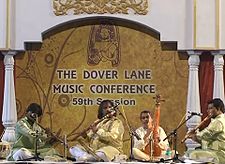Dover Lane Music Conference: Difference between revisions
Appearance
Content deleted Content added
m Bot: links syntax |
m Add short desc, ce |
||
| (39 intermediate revisions by 28 users not shown) | |||
| Line 1: | Line 1: | ||
{{ |
{{Short description|Indian classical music festival}} |
||
{{More citations needed|date=March 2017}} |
|||
{{EngvarB|date=March 2017}} |
|||
{{Use dmy dates|date=March 2017}} |
|||
{{Infobox music festival |
|||
| music_festival_name = The Dover Lane Music Conference |
| music_festival_name = The Dover Lane Music Conference |
||
| image = [[File:Dover Lane Music Festival - 2011.jpg|225px]] |
|||
| image = |
|||
| caption = Performance at the Dover Lane Music Conference |
|||
| caption= |
|||
| location = [[Nazrul Mancha]], [[Kolkata]], [[India]] |
| location = [[Nazrul Mancha]], [[Kolkata]], [[India]] |
||
| years_active = 1952 - Present |
| years_active = 1952 - Present |
||
| founders = |
| founders = |
||
| dates = January 22nd to 25th/26th |
| dates = January 22nd to 25th/26th |
||
| genre = [[Indian classical music|Classical]] |
|||
| website = [http://doverlanemusicconference. |
| website = [http://doverlanemusicconference.org/ doverlanemusicconference.org] |
||
}} |
}} |
||
'''The Dover Lane Music Conference''' is an annual Indian classical music festival held in the month of January at [[Nazrul Mancha]], an outdoor auditorium in south Kolkata. |
|||
The Dover Lane Music Conference is an all night concert attended by visitors from all over the world. It typically showcases vocal recital, sitar, sarod, and violin music.<ref>{{cite journal |last1=Noone |first1=Mathew |title=North Indian Classical Music and the Kolkata Experience |journal=Ethnomusicology Ireland |date=July 2013 |page=27 |url=http://www.ictm.ie/wp-content/uploads/2013/08/ICTM-journal-Noone.pdf |access-date=4 November 2021}}</ref> |
|||
==History== |
==History== |
||
The festival derives its name from the fact that it originally took place at a location on Dover Lane courtesy the patronage of Late Sri Narendra Singh Singhi at his residence, Singhi Park.<ref>{{cite web|url=http://www.hindu.com/thehindu/mag/2002/02/10/stories/2002021000430400.htm |archive-url=https://web.archive.org/web/20030630213311/http://www.hindu.com/thehindu/mag/2002/02/10/stories/2002021000430400.htm |url-status=dead |archive-date=2003-06-30 |title=Rhythm of Kolkata |date=2002-02-10 |work=[[The Hindu]] |access-date=2013-01-25}}</ref> |
|||
The festival had humble beginnings in 1952. Music lovers from the by-lanes of Kolkata used to gather in order to appreciate Indian classical music recitals. Over time, the festival has undergone many changes. Many stalwarts of Indian classical music have performed at the festival. The number of days and the number of artistes performing have increased, and a large number of sponsors are now associated with the event. |
|||
== |
==See also== |
||
| ⚫ | |||
Instead of the original venue on Dover Lane, this annual event is now organized in the [[Nazrul Mancha]] on [[Southern Avenue]]. The office of the organizing body is still at 18/2 Dover Lane. The festival is usually held between the 22nd and the 25th of January (continuing up to daybreak on the 26th). |
|||
| ⚫ | |||
* [[Swara Samrat festival]] |
|||
==Character== |
|||
The festival lasts for four days and is observed every year. Apart from established musicians, youngsters are also encouraged to participate and display their talent. As a rule, the performances begin late in the evening and go on all night, ending next day in the morning. |
|||
The festival draws a very large crowd every year, with tickets sold out within days of them being made available. |
|||
Therefore, the Dover Lane Music Festival has become one of the most important cultural events of the year with performances by a number of eminent musicians from all over the country. |
|||
==References== |
==References== |
||
{{reflist |
{{reflist}} |
||
==External links== |
==External links== |
||
* {{official website|http://www.doverlanemusicconference.org//}} |
|||
* {{commons category-inline}} |
|||
| ⚫ | |||
| ⚫ | |||
| ⚫ | |||
| ⚫ | |||
| ⚫ | |||
| ⚫ | |||
[[Category:Hindustani classical music festivals]] |
[[Category:Hindustani classical music festivals]] |
||
[[Category:Recurring events established in 1952]] |
[[Category:Recurring events established in 1952]] |
||
| ⚫ | |||
[[Category:Events in Kolkata]] |
|||
{{festival-stub}} |
|||
| ⚫ | |||
[[bn:ডোভার লেন সংগীত সম্মেলন]] |
|||
Latest revision as of 00:46, 25 February 2024
This article needs additional citations for verification. (March 2017) |
| Dover Lane Music Conference | |
|---|---|
 Performance at the Dover Lane Music Conference | |
| Genre | Classical |
| Dates | January 22nd to 25th/26th |
| Location(s) | Nazrul Mancha, Kolkata, India |
| Years active | 1952 - Present |
| Website | doverlanemusicconference.org |
The Dover Lane Music Conference is an annual Indian classical music festival held in the month of January at Nazrul Mancha, an outdoor auditorium in south Kolkata. The Dover Lane Music Conference is an all night concert attended by visitors from all over the world. It typically showcases vocal recital, sitar, sarod, and violin music.[1]
History
[edit]The festival derives its name from the fact that it originally took place at a location on Dover Lane courtesy the patronage of Late Sri Narendra Singh Singhi at his residence, Singhi Park.[2]
See also
[edit]References
[edit]- ^ Noone, Mathew (July 2013). "North Indian Classical Music and the Kolkata Experience" (PDF). Ethnomusicology Ireland: 27. Retrieved 4 November 2021.
- ^ "Rhythm of Kolkata". The Hindu. 10 February 2002. Archived from the original on 30 June 2003. Retrieved 25 January 2013.
External links
[edit]- Official website
 Media related to Dover Lane Music Conference at Wikimedia Commons
Media related to Dover Lane Music Conference at Wikimedia Commons
